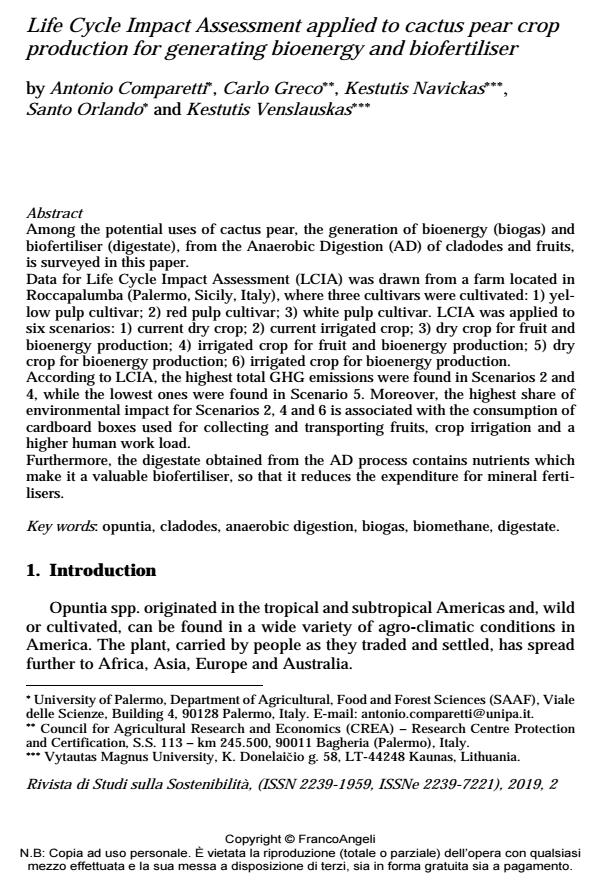Life Cycle Impact Assessment applied to cactus pear crop production for generating bioenergy and biofertiliser
Journal title RIVISTA DI STUDI SULLA SOSTENIBILITA'
Author/s Antonio Comparetti, Carlo Greco, Kestutis Navickas, Santo Orlando, Kestutis Venslauskas
Publishing Year 2020 Issue 2019/2 Suppl.
Language English Pages 15 P. 315-329 File size 218 KB
DOI 10.3280/RISS2019-002-S1020
DOI is like a bar code for intellectual property: to have more infomation
click here
Below, you can see the article first page
If you want to buy this article in PDF format, you can do it, following the instructions to buy download credits

FrancoAngeli is member of Publishers International Linking Association, Inc (PILA), a not-for-profit association which run the CrossRef service enabling links to and from online scholarly content.
Among the potential uses of cactus pear, the generation of bioenergy (biogas) and biofertiliser (digestate), from the Anaerobic Digestion (AD) of cladodes and fruits, is surveyed in this paper. Data for Life Cycle Impact Assessment (LCIA) was drawn from a farm located in Roccapalumba (Palermo, Sicily, Italy), where three cultivars were cultivated: 1) yellow pulp cultivar; 2) red pulp cultivar; 3) white pulp cultivar. LCIA was applied to six scenarios: 1) current dry crop; 2) current irrigated crop; 3) dry crop for fruit and bioenergy production; 4) irrigated crop for fruit and bioenergy production; 5) dry crop for bioenergy production; 6) irrigated crop for bioenergy production. According to LCIA, the highest total GHG emissions were found in Scenarios 2 and 4, while the lowest ones were found in Scenario 5. Moreover, the highest share of environmental impact for Scenarios 2, 4 and 6 is associated with the consumption of cardboard boxes used for collecting and transporting fruits, crop irrigation and a higher human work load. Furthermore, the digestate obtained from the AD process contains nutrients which make it a valuable biofertiliser, so that it reduces the expenditure for mineral fertilisers.
Keywords: Opuntia, cladodes, anaerobic digestion, biogas, biomethane, digestate.
- Evaluating Switchgrass (Panicum virgatum L.) as a Feedstock for Methane Production in Northern Europe Eglė Norkevičienė, Kęstutis Venslauskas, Kęstutis Navickas, Carlo Greco, Kristina Amalevičiūtė-Volungė, Vilma Kemešytė, Aurelija Liatukienė, Giedrius Petrauskas, Bronislava Butkutė, in Agriculture /2025 pp.1244
DOI: 10.3390/agriculture15121244
Antonio Comparetti, Carlo Greco, Kestutis Navickas, Santo Orlando, Kestutis Venslauskas, Life Cycle Impact Assessment applied to cactus pear crop production for generating bioenergy and biofertiliser in "RIVISTA DI STUDI SULLA SOSTENIBILITA'" 2 Suppl./2019, pp 315-329, DOI: 10.3280/RISS2019-002-S1020